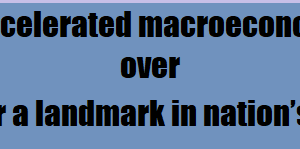
Ethiopia is working to transform its food and nutrition systems alongside its development efforts to ensure food security for its citizens. In particular, it is working with relevant partners more than ever to achieve the United Nations Sustainable Development Goals and the Paris Climate Agreement within the time frame set.
According to information received from the Ethiopian Agricultural Transformation Institute; the United Nations believes that working on food systems is a great opportunity to accelerate the implementation of the 2030 sustainable development goals and bring about change; for this, it has hosted Food Systems Summit in New York in September 2021. The summit aimed to recognize the need for countries to transform their food systems to achieve healthy, sustainable and equitable diets.
Ethiopia, as a member state of the United Nations and a participant in the conference, is bringing this work home and is developing and implementing the Ethiopian Food System and Nutrition (EFSN) Roadmap, a comprehensive food system and nutrition roadmap that are aligned with the United Nations Food System Framework and the Sustainable Development Goals.
This roadmap aims to promote a nutritious, accessible and natural food system that benefits the Ethiopian people. A council has been established comprising 16 ministries, including the recently joined Ministry of Labor and Skills, with a shared mandate. The council is co-chaired by the Ministries of Agriculture and Health. The Ethiopian Agricultural Transformation Institute is also serving as the secretariat of the council.
According to Kefelegn Getahun (PhD), Coordinator of the Ethiopian Food System and Nutrition Program, Ethiopia’s food system and nutrition is a big agenda. The country has come a long way compared to African countries in terms of establishing a climate-resilient food system.
Four years after its launch, this program has been working on a concrete and effective work by focusing on the sector and bringing together the works accomplished by various government institutions. In particular, the results recorded in the green legacy, Yelemat Tirufat and wheat development projects are playing a crucial role in ensuring food security and access to nutritious food for citizens.
Kefelegn (PhD) said that the Ethiopian Food System Transformation and Nutrition Program is being implemented in seven clusters; the clusters will mainly work on ensuring the availability and accessibility of safe and nutritious food. This means that, in addition to increasing crop productivity and accessibility, it will focus on ensuring that all citizens have access to safe and nutritious food. The cluster will work to transform supply and access based on five transformative solutions.
In addition, strengthening Ethiopia’s national food security management and control system; supporting the expansion of smallholder, greenhouse and horticultural production to increase the supply of balanced and nutrient-rich food (from animals and plants); and using bio-fortification to enrich industrially produced foods are other areas of focus for the cluster.
These include increasing food production and consumption; strengthening climate-friendly livestock value chains; and modernizing and improving indigenous food production and processing. These transformative solutions aim to address the nutritional challenges facing Ethiopia by improving food security, diversifying food sources, and increasing access to nutritious food.
He noted that it will work to produce safe and nutritious food by strengthening systematic analysis and approaches; introducing new practices and strengthening government commitment; and developing national dietary guidelines to ensure reliable and sustainable awareness among the public.
Kefelegn (PhD) further explained that the third cluster will work to promote agricultural transformation through integrated policies and systems. He also explained that it aims to implement integrated and coherent policies to facilitate rapid food system transformation by addressing land availability and ownership constraints, access to financial services and other priority issues.
Most policies are developed by the government; it works to expand the limited interaction of experts. To bring about a change in the mindset of the food system among the society, it is necessary to work together on different policies for the common good. Working together allows policymakers to anticipate the challenges and opportunities of the policies they are implementing.
According to him; accelerating mechanization, improved digital technology and fostering innovation are other focuses of the program. The Ethiopian Food System Transformation and Nutrition Cluster focuses on the use of improved varieties, improved animal breeds, fertilizers, agrochemicals and microorganisms to increase agricultural productivity. It also promotes innovation in agriculture, the adoption of agricultural machinery and information services technologies.
There are also clusters that focus on expanding agricultural trade by establishing crop specialization and product corridors; improving supply chain management, market access and market information systems; as well as community risk management and protection of low-income communities. This will be of great help in effectively managing the risks in the Ethiopian food system and ensuring food security throughout the country.
Kefelegn (PhD) noted that Ethiopian economic and food system stakeholders, especially farmers, are vulnerable; “The COVID-19 pandemic has put the livelihoods of millions of people who depend on the food system at risk nationwide,” he said, adding that locust swarms are having a significant impact on farmers’ incomes. Sustainable growth through skills development, technology innovation centers, rural electrification and urbanization is a focus of the seventh cluster.
He noted that these strategic issues are designed to facilitate growth, support communities and prepare for major changes; in particular, he noted that rural electrification has been given great attention to introduce environmentally friendly and climate-friendly technologies.
Kefelegn (PhD) also explained that decentralization, climate-resilient urban centers, equitable land use planning, and strategies for sustainable cities are also among the issues that have been identified as solutions. He noted that developing innovations that can build diverse skills, developing technologies, and establishing vocational training centers are among the main tasks that will enable the country to achieve the Sustainable Development Goals within the set timeframe.
He noted that the Ethiopian Food System Transition and Nutrition Program plays a crucial role in achieving the Sustainable Development Goals and implementing the Paris Climate Change Agreement, and stressed that its rapid and coordinated work should continue. In this regard, he said that the Ethiopian Food System and Nutrition Development Program, which is being implemented in collaboration with 16 ministries and partner organizations, is a responsible and active part of all stakeholders; it will create an enabling environment to achieve the goal.
He said that it has a significant role in saving resources and energy that were previously wasted by bringing together work that was previously done separately. He also said that it will change the distorted understanding of food and a balanced food system from all government institutions to farmers and make their work more consistent in this way.
On the other hand, he pointed out that the work of building an agricultural system that is resilient to climate change requires sustainable and continuous work from preparing agricultural land to delivering it to the user. Along with the efforts to increase productivity, he noted that much is expected from all stakeholders to work effectively by eliminating deforestation, misuse of water resources, and post-harvest losses, as well as practices that cause greenhouse gas emissions.
BY BACHA ZEWDIE
THE ETHIOPIAN HERALD SUNDAY EDITION 13 APRIL 2025





